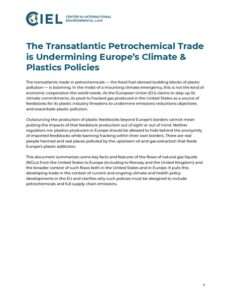
The transatlantic trade in petrochemicals — the fossil fuel-derived building blocks of plastic pollution — is booming. In the midst of a mounting climate emergency, this is not the kind of economic cooperation the world needs. As the European Union (EU) claims to step up its climate commitments, its pivot to fracked gas produced in the United States as a source of feedstocks for its plastic industry threatens to undermine emissions reductions objectives and exacerbate plastic pollution.
Outsourcing the production of plastic feedstocks beyond Europe’s borders cannot mean putting the impacts of that feedstock production out of sight or out of mind. Neither regulators nor plastics producers in Europe should be allowed to hide behind the anonymity of imported feedstocks while banning fracking within their own borders. There are real people harmed and real places polluted by the upstream oil and gas extraction that feeds Europe’s plastic addiction.
The Transatlantic Petrochemical Trade is Undermining Europe’s Climate & Plastics Policies summarizes some key facts and features of the flows of natural gas liquids (NGLs) from the United States to Europe (including to Norway and the United Kingdom) and the broader context of such flows both in the United States and in Europe. It puts this developing trade in the context of current and ongoing climate and health policy developments in the EU and clarifies why such policies must be designed to include petrochemicals and full supply chain emissions.
Read the briefing.
Curious to learn more about how the developing transatlantic trade in petrochemicals plays a role in the context of the upcoming EU Methane Regulation and why it’s critical that the regulation is designed to include petrochemicals and full supply chain emissions? Read the backgrounder.
Originally posted on December 1, 2021
